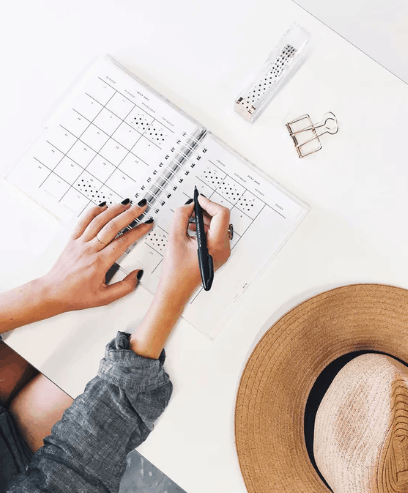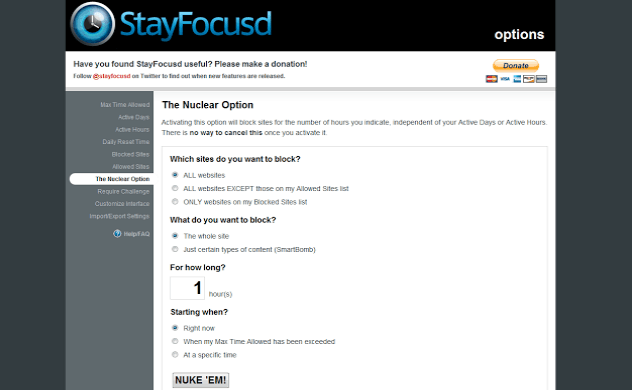
Sometimes, it feels like every college student in the world is playing a little game I like to call Battle of the Insomniacs.
It consists of undergraduates attempting to one-up each other with a variation of the following phrases: “Sleep is for the weak.” “I’ll sleep when I’m dead — right now, that 4.0 upper-division GPA is calling my name.” “Oh yeah? Well, I haven’t slept since 2012.”
Come finals week, the battle turns into a full-blown war. Students camp out on campus, the local Starbucks becomes inundated with freshmen, and even your uni’s football prodigy will join the fun by unwrapping the plastic off of his newly-minted History of Jazz textbook.
But what if I told you that you could get all A’s on your exams and final papers without sacrificing your precious 7- to 8- hour sleep schedule?
Friends, it can be done. Keep reading for our guide to efficient studying!
Table of Contents
1. Make a schedule

I know what you’re thinking: Why should I waste my precious study time to write out a list that I won’t even look at, let alone follow? Well, hear me out.
While it may sound counter-intuitive at first, planning out your daily goals in a short, comprehensive to-do list is a great way to get your brain into study mode. So, create a bullet list of projects you need to get done today and then use that energy to fuel the remainder of your work-filled day.
2. Give yourself time off
Experts say you’re better off taking small breaks (“small” is the keyword here!) than trying to go for an intense, long work session. For every 45 minutes of real effort, reward yourself with 15 minutes of Youtube videos or a page of your favorite adult coloring book. Just stay away from TV shows or movies — they’ll suck you in faster than you can say, “Oh, look! The latest episode of This is Us is on Hulu!”
For efficient studying, I suggest splitting your time between different tasks after each break. This way, you’re less likely to get bored easily, and you can make connections between different aspects of a larger project.
3. Think confidently
Don’t allow yourself to get so overwhelmed by work that it makes you unproductive and miserable. Instead, repeat the following words out loud: “I can do this. I am smart. I am capable. I am a living, breathing, studying machine.”
Go get ’em, tiger.
4. Install a productivity booster

Browser extensions like StayFocusd and Block site do the hard part for you — they block time-consuming websites (e.g., Facebook, Instagram, Twitter, Buzzfeed, and, of course, College Fashion) so that you can focus 100% on the work you have ahead of you. We’ll miss you but we’ll see you when you get done!
Say goodbye to social media distractions and hello to mastering Latin declensions.
5. Stick to what works for you
If listening to instrumental music helps you relax and write better, do it. If you need total silence to work in, scout out your favorite spot and stick it out until you get the results you’re looking for. Trust what’s been proven to be effective in the past for you, and fine-tune your experience to what kind of learner you are (e.g., visual, auditory, haptic).
Have no clue what’s your best study technique? Check out this handy guide by AcademicTips.org.
6. Quiz yourself with friends and family
The best way to know if you’ve learned something is if you can explain it in a sentence or two.
Once you feel you’ve mastered the vocabulary, test yourself by phoning a parent and talking them through what you’ve learned in as much detail as possible. The gaps in your knowledge will suddenly become very clear, and you’ll know what topics to pay special attention to. (Of course, unless you want your mom or dad to be seriously confused, give them some warning beforehand!)
7. Create a mind palace

Popularized by the BBC/Masterpiece Sherlock and used by the Ancient Greeks, a mind palace is a mental trick you can use to plot out, and recall, memories. It’s essentially a mnemonic device .
To create your own mind palace, Smithsonian.com recommends the following:
“Visualize a complex place in which you could physically store a set of memories. That place is often a building such as a house, but it can also be something like a road with multiple addresses. In the house version, every room is home to a specific item you want to remember. To take advantage of the mind’s ability to hold onto visual memories, it often helps to embellish the item being stored—the milk you need to buy at the grocery store might become a vat of milk with a talking cow swimming in it. When those memories need to be recalled, you can walk through the building in your mind, seeing and remembering each item.”
Is it working?
Now comes the hard part…
Once you finish this list and close the tab (or, keep it open for future reference), you’ll have to take the information I’ve thrown at you and use it.
I’m confident you’ll do a splendid job at efficient studying, but if you need more motivation, check out the “Daily Motivation” Youtube channel! And don’t forget to share the article with your equally stressed-out friends; chances are they need the push just as much as you do.
